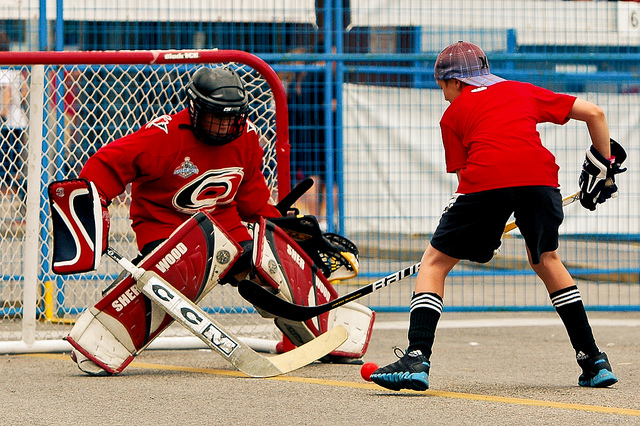"Drop-in ball hockey and participation at the YMCA"
April 22 The first goal in sports is having fun, writes Alvin Ma, 21, a Commonwealth Correspondent from Canada. But how well recreation centres make newcomers – and those from other cultures – welcome has a big impact on participation.
The first goal in sports is having fun, writes Alvin Ma, 21, a Commonwealth Correspondent from Canada. But how well recreation centres make newcomers – and those from other cultures – welcome has a big impact on participation.
“It’s fun to stay at the Y-M-C-A” goes the refrain of the famous Village People disco song. As someone studying sport policy, I decided to see if it’s true.
What is the experience of a new visitor to a Toronto-area YMCA drop-in ball hockey program? Some students at an English language centre where I occasionally teach have memberships at this particular YMCA location, which allows them to participate in drop-in ball hockey alongside other fitness programs. None of them (to my knowledge) has tried this sport, though some have considered participating especially after being “inspired” from watching hockey during the recent Winter Olympics.
I have played ball hockey extensively at various different settings. Some friends at one location would affectionately call me “Captain” because I would be the most outspoken in terms of enforcing fair play. Other times, particularly when I play drop-in hockey with complete strangers as a younger, smaller, and less-skilled participant, I want to blend in as seamlessly as possible without questioning the ‘old boy’ culture of playing hard and leaving non-hockey topics out of the conversation.
I attempted to share the perspective of a complete newcomer to hockey when I walked into this YMCA for the first time. After all, the YMCA in Greater Toronto’s website specifically has a section on “Newcomers.” People migrate to Toronto from all around the world, bringing with them a variety of different cultural experiences. Some international travellers may have encountered different experiences at YMCA locations around the world and they may have been drawn to the YMCA due to its international brand acclaim.
One participant I interviewed says: “I like playing here but I’m disappointed with my performance. I’m more used to playing baseball than hockey, as my brothers are the ones who usually play this sport, but I should change…hockey’s a Canadian sport and I should be a better Canadian, you know?” This quote characterizes the mythical status that hockey holds in Canadian society, particularly in the nationalistic aftermath of the 2014 Sochi Olympics when Team Canada won both the men’s and women’s ice hockey gold medals. While we cannot dismiss the opinions of those whose motivation for participation is driven by patriotism, it is problematic if performance is emphasized too much.
I also interviewed a volunteer coordinator who has played at this YMCA for over 30 years, who says: “We’re very welcoming and treat beginners and the odd female player well. They don’t get aggressive and they give them extra chances…but some players are competitive and if they think you can play at their level, they will play extra hard and try to beat you.”
While emphasis on high performance can be problematic, many fans of professional sports admire the trait of doing anything to win, including myself to a certain extent. My favourite professional hockey player growing up was Trevor Linden because he often raised his performance in playoff games despite playing with broken ribs among other injuries, prompting one commentator to exclaim: “He will play, you know he’ll play, he’ll play on crutches!”
When asked about playing through pain, the same coordinator boasts of his similar competitive nature before taking a more nuanced approach for other participants: “I got hit on the head with a stick…put a bandage on and continued playing. I broke my nose, I broke my finger, I taped it up…for me, I’m here to play, and if I’m hurting, that’s not going to stop me from playing…However, everybody plays a certain way…the more skilled player or the average newcomer person doesn’t want to get hit that much. Some guys have to wake up early to work the next morning too. I always warn people when they first come that guys take slap shots so get out of the way if you don’t want to get hurt.” Although I heard the last tip and, as a forward, I am not known to block shots anyway, I felt that the dominant masculine social pressure was there to take the risk of injury. For a newcomer, the several stinging bruises and red marks on my skin from blocking shots and receiving slashes without padding might not be appealing.
Beyond ball hockey, supportive staff members and volunteers are central to the experience of a new visitor. If the new visitor is poorly treated, it is unlikely that he or she will proceed to play ball hockey in the gymnasium. By coincidence I happened to cross paths with a front desk volunteer at a different location in the city nearly a week after my last visit to the YMCA, who recognized me and encouraged me to continue my study. While it may be personally “fun to stay at the Y-M-C-A,” I know that these experiences may not be shared by everyone. YMCAs are united in their attempt to develop a healthy spirit, body, and mind, but YMCA locations in other Commonwealth countries – and even within Canada – operate with different community objectives. Nevertheless, the general emphasis is on opportunity for amateur sport participation. As I’ve written before: “The first goal [whether or not it takes place at the YMCA] is having fun.”
photo credit: Ryan Tir via photopin cc
…………………………………………………………………………………………………
About me:
I’m currently a student and research assistant for the Centre for Sport Policy Studies at the University of Toronto. I also teach English at an ESL language school and serve as a private tutor for various other subjects. Passionate about teaching, sports, and politics, I hope to blend these interests and one day teach university-level courses on the politics of sports.
………………………………………………………………………………………………………
Opinions expressed in this article are those of the author and do not necessarily represent the views of the Commonwealth Youth Programme. Articles are published in a spirit of dialogue, respect and understanding. If you disagree, why not submit a response?
To learn more about becoming a Commonwealth Correspondent please visit: http://www.yourcommonwealth.org/submit-articles/commonwealthcorrespondents/
…………………………………………………………………………………………………




